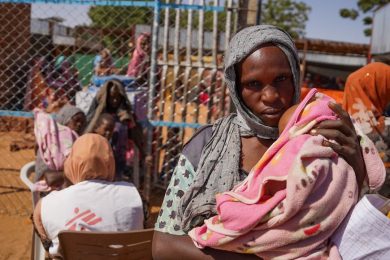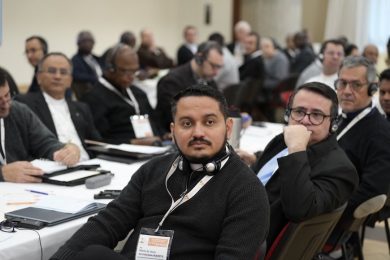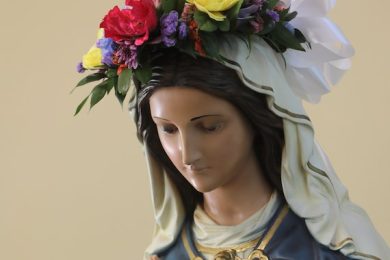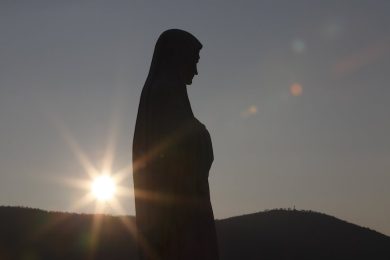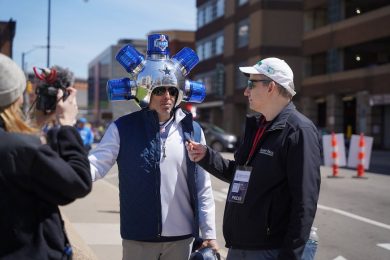By Barb Fraze | OSV News
This December, when Catholic villagers in northern Ivory Coast are preparing for Christmas, many will be organizing Advent food and supplies for the nearly 42,000 refugees who have fled into their country from the Sahel, said the head of the Commission of Integral Human Development for the bishops of Ivory Coast.

Most of those refugees are Muslim, fleeing violence from Islamic extremists perpetrating violence against Muslims as well as Christians, said Bishop Joseph Kakou Aka of Yamoussoukro.
“We want to bring them some smiles,” Bishop Aka told OSV News during a mid-November visit to Washington. He described the situation as a “terrible humanitarian crisis.”
One night, a priest in a parish near the border called the bishop of Bondoukou for help because a family of six had to host 50 or more people who had fled across the border. “These are houses that we see in the villages,” where people go outside to the toilet, Bishop Aka said. In addition, the welcoming villagers had to find food for the refugees, he said, noting that in Africa, “You don’t have to be full … you share what you have.”
The Catholic aid agency Caritas and the bishops’ conference called on people in other dioceses for help, and the diocese called in the U.S. bishops’ Catholic Relief Services, a Caritas partner, to help with technical issues. “The need is still increasing,” he added.

Bishop Aka said most refugees in northern Ivory Coast flee from Burkina Faso, Mali and Niger in the Sahel, a belt of 10 countries stretching across Africa, transitioning the continent’s geography from the northern Sahara Desert to the more arid savannas to its south. The United Nations says nearly 38 million people in the Sahel need life-saving aid and support, and more than 4.4 million people are displaced in Burkina Faso and Mali, two countries that border Ivory Coast. The 10-year crisis has been attributed to violence, which includes aid being cut off to those most in need.
A Catholic delegation from Ivory Coast traveled to Washington to raise awareness of the situation. Accompanied by staffers from CRS, they met with Senate and House staffers on Capitol Hill, members of the State Department, the U.S. Agency for International Development, the Carnegie Endowment for International Peace and the U.S. Commission on International Religious Freedom.
Bishop Aka said they told the U.S. leaders that, because of the world situation, politicians might shift attention to regions like the Middle East and Ukraine, “but they should not forget the Sahel.”
“We didn’t meet any resistance,” he said. “We spoke to listening ears.”
The bishop described the violence in the Sahel as a cancer, noting that if, unchecked, it could extend to coastal countries. Islamic militants attacked an Ivorian beach resort in 2016, killing 19 people and wounding 33 others. Border post attacks also have left some of the bishop’s countrymen dead.

“We need humanitarian aid,” he said. “We need humanitarian protection for the refugees” and internally displaced persons.
In a Nov. 15 panel discussion at the University of Notre Dame’s Keough School of Global Affairs in Washington and in the interview with OSV News, Bishop Aka said although France and the European Union have had peacekeeping troops in the Sahel for 10 years, “we haven’t achieved the peace that is needed so that people can return to their homes.” He called instead for “intensive diplomatic efforts on the ground.”
Donor countries such as the United States need to hold the leaders of Sahel countries accountable, he said, adding that the countries need an influx of financial assistance.
Faith-based leaders in the region — not just Christian, but also Muslim — are trying to change the approach to peace. They are participating in the Catholic-led Sahel Peace Initiative, which helps those affected — especially women and children — and advocates interreligious dialogue and reconciliation.
Bishop Aka told OSV News the religious leaders believe it is important that all those involved know both sides have rights and responsibilities. They also try to defuse situations, some of which are practical. For instance, if refugees have animals, the animals destroy planted crops when they graze. Couldn’t someone find an open range where these animals can graze, he asked.
– – –
Barb Fraze writes for OSV News from Washington.




